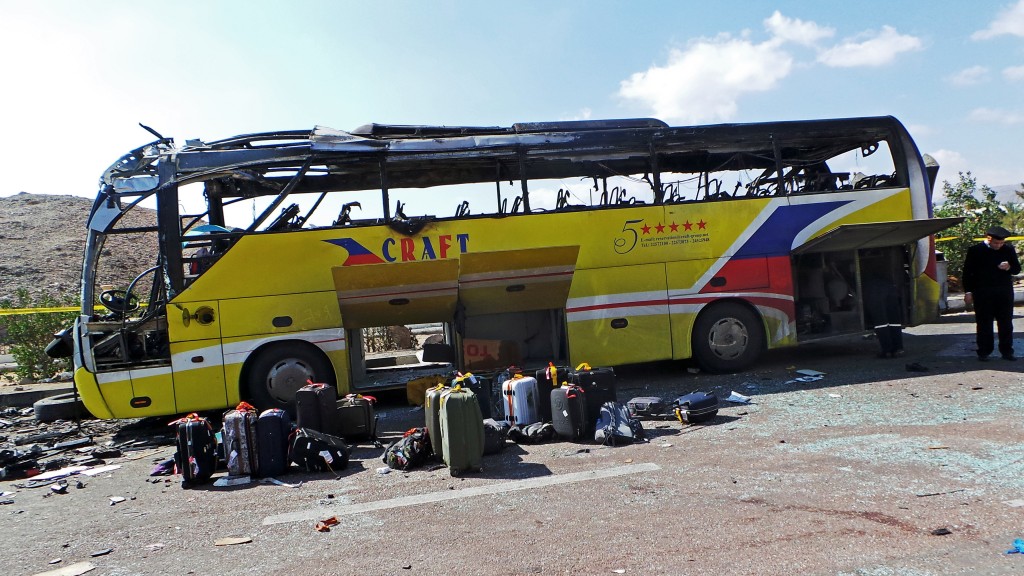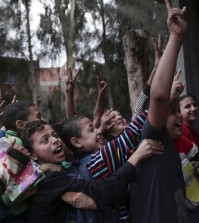- California Assembly OKs highest minimum wage in nation
- S. Korea unveils first graphic cigarette warnings
- US joins with South Korea, Japan in bid to deter North Korea
- LPGA golfer Chun In-gee finally back in action
- S. Korea won’t be top seed in final World Cup qualification round
- US men’s soccer misses 2nd straight Olympics
- US back on track in qualifying with 4-0 win over Guatemala
- High-intensity workout injuries spawn cottage industry
- CDC expands range of Zika mosquitoes into parts of Northeast
- Who knew? ‘The Walking Dead’ is helping families connect
Koreans no longer off terrorists’ target lists

An Egyptian policeman stands guard in front of a damaged bus after a deadly explosion Sunday near the Egyptian border crossing with Israel in Taba, Egypt, Monday, Feb. 17, 2014. An explosion tore through a bus filled with Korean sightseers in the Sinai Peninsula on Sunday, killing at least four people and raising fears that Islamic militants have renewed a bloody campaign to wreck Egypt’s tourism industry. (AP Photo)
By Kang Seung-woo
Koreans have been victims of terrorism in the Middle East Asia and Africa over the past 10 years, with the fatal incident in Egypt, Sunday, being the latest.
According to the Ministry of Foreign Affairs, Monday, a total of 95 Koreans have been killed in troubled areas around the world since 2003, with 65 losing their lives in the Middle East Asia and Africa.
Kim Sun-il, working for Cana General Trading, a supplier for the U.S. military, was abducted by an Islamist group in May 2004. The kidnappers demanded Korea cancel its troop dispatch to Iraq, but decapitated him after the Korean government rejected it ― 22 days after his abduction. In addition, they made public the video footage of Kim’s execution.
In July 2007, 23 Korean missionaries from Saemmul Community Church were captured and held hostage by members of the Taliban in Afghanistan. The group ― 16 women and seven men ― was kidnapped while traveling to Kabul and, for 41 days, they were held hostage in cellars and farmhouses, regularly being moved in groups of three to four.
Pastor Bae Hyung-kyu and Shim Sung-min, one of lay believers on the group, were executed before the release of the remainder following negotiations between the Korean government and the Taliban.
Koreans were victimized by a suicide attack in March 2009, when a bomb killed four Korean tourists and their local guide in Yemen, the poorest nation in the Middle East and home to restive tribes. The attack occurred as the victims were touring a UNESCO World Heritage site ― aimed at targeting foreigners visiting this poor Arab country that has both famed historic sites and a strong al-Qaida presence.
Three months later, a 34-year-old woman working for Worldwide Service, an international NGO for medical services, was found dead after going missing.
In 2012, three Koreans were captured also on the Sinai Peninsula, where Sunday’s tourist bus blast took place, but were released one day later without injury.
In January, Han Seok-woo, the chief of the Libya unit of the Korea Trade-Investment Promotion Agency (KOTRA) was abducted by Libyan gunmen for four days, but released unharmed after Libyan forces arrested the kidnappers.















